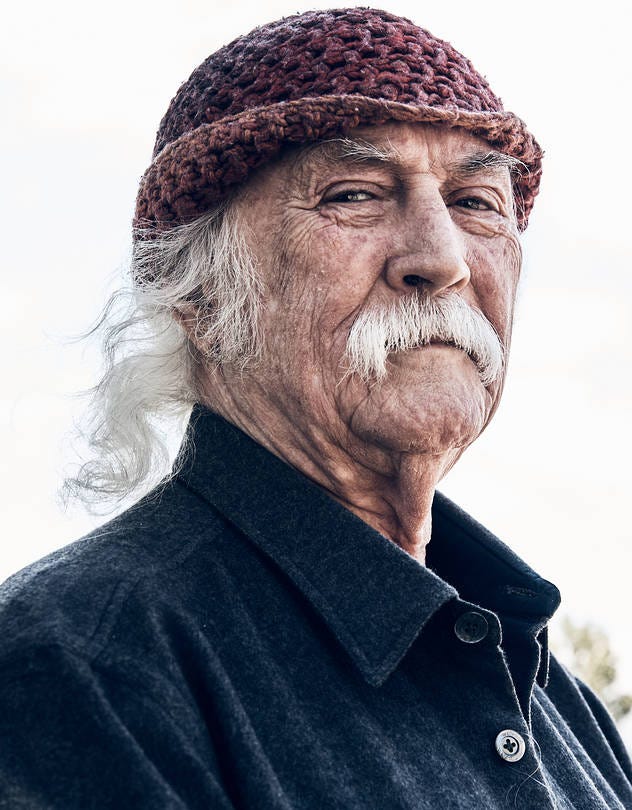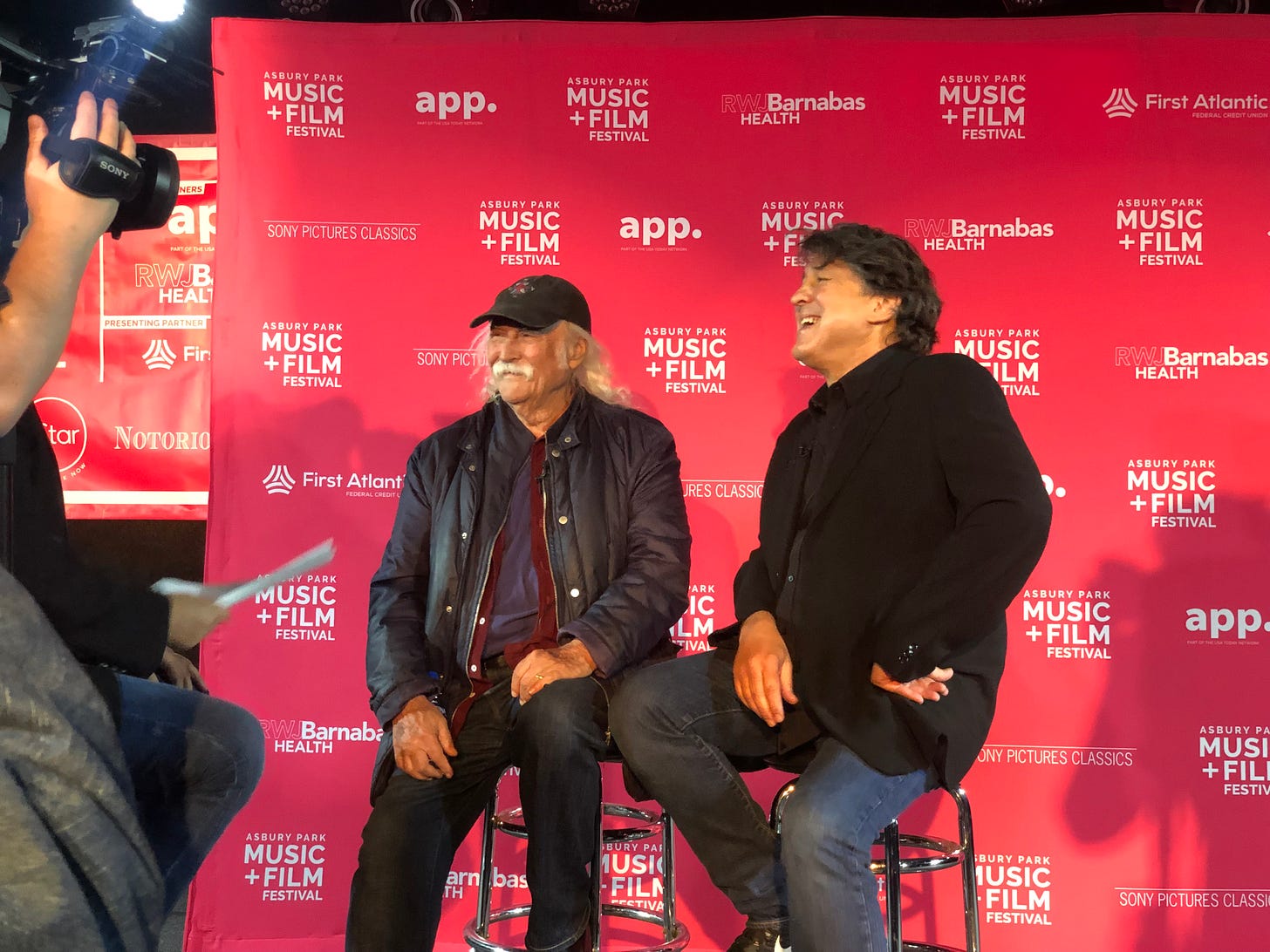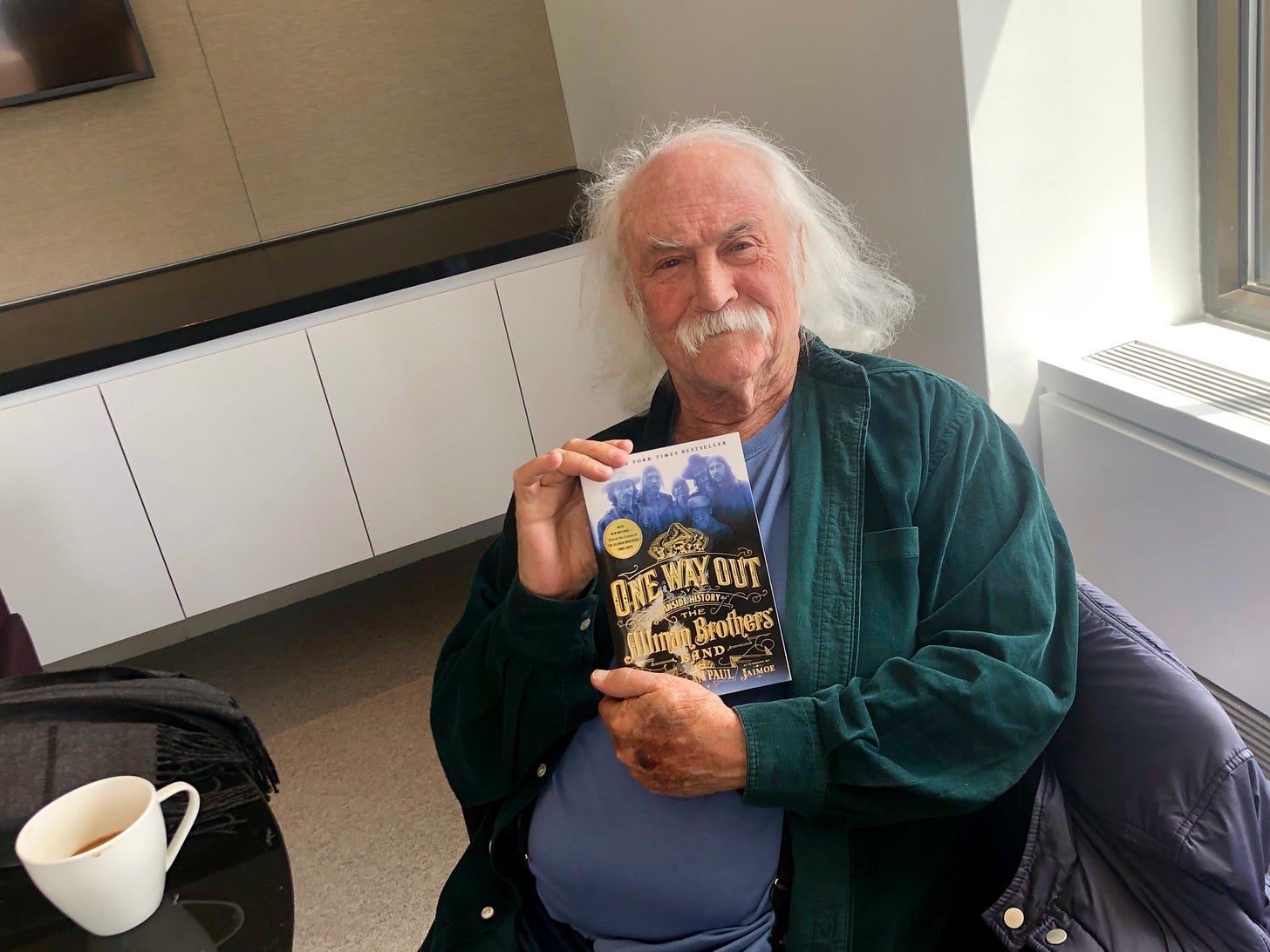RIP David Crosby
Terrible news today that the 81-year-old irascible singer/songwriter has passed away. In my 2019 WSJ profile - the first of many I have since done - he directly addressed his failing health.
David Crosby Is Making Songs as He Faces the End
Burdened by an array of health problems, the legendary singer-songwriter says he is ‘trying to get the music out of my head’
Enjoy the article and rest in peace Croz. This blog is ever free. If you enjoy, please subscribe and share.
Aging rock legends don’t generally record a lot of new music. The incentives are low in today’s age of streaming, when money is made on the road as longtime fans come out to hear elderly icons play their hits. So why is David Crosby —77 years old and a two-time Rock and Roll Hall of Fame entrant, as a member of both the Byrds and Crosby, Stills & Nash—releasing albums at a feverish clip, dropping four in the past five years?
Mr. Crosby smiles slightly at the question before answering simply, “Because I’m going to die.”
He stirs cream into his coffee and takes a sip before continuing. “I have eight stents in my heart, and I’m going to have a heart attack in the next year or two, and that’ll be it,” he says. “I’m trying to get the music out of my head first.”
Early in the new documentary movie “David Crosby: Remember My Name,” the musician says flatly that he is afraid of dying after battling hepatitis C, receiving a liver transplant and now struggling with diabetes, on top of his cardiac issues. But sitting in an executive dining room at Manhattan’s Sony building, Mr. Crosby discusses his demise with matter-of-fact directness.
“People don’t talk about death, or they adopt some fairy tale like sitting on a cloud playing a little harp. Hogwash. No matter how long you have, the question is the same: What are you going to do with it? I want to make the world better, and the only thing I can contribute is music. I can make good music that will lift you up. That’s what I’m supposed to do.”
Mr. Crosby’s extraordinary 55-year career has seen him rise to the heights of stadium stardom and fall to the lows of being a disgraced, jailed junkie. He still has his beautiful, soaring voice and his knack for jazz-tinged acoustic songs, and he remains a clear-eyed chronicler of history, both personal and cultural.
“I wasn’t prepared that he would go so deeply into the tissue of his soul,” says the filmmaker Cameron Crowe, who produced “Remember My Name,” which opens in New York and Los Angeles theaters on July 19. “Croz is fascinating because he’s been at the forefront of so much American culture for so long.”
Mr. Crosby was at the epicenter of the Age of Aquarius. The son of Floyd Crosby, an Oscar-winning cinematographer known for his work on films such as “High Noon,” the guitarist co-founded the electric folk group the Byrds. When the Beatles held a press conference on their 1966 American tour, Mr. Crosby was sitting right behind them. He played the three most significant festivals of the ’60s: Monterey, Woodstock and Altamont—arguably the beginning, middle and end of the hippie era.
He later became part of Crosby, Stills, Nash & Young, which wrote, recorded and released “Ohio”—one of the all-time great protest songs—within weeks of four students being shot and killed by National Guard troops at Kent State University in 1970. The group filled stadiums, but its members were sabotaged by raging egos and infighting.
Mr. Crosby became a junkie, nodding off on stage. He wound up in jail in 1985 on cocaine-possession and weapons charges and credits his eight-month stint behind bars with saving his life by forcing him to get sober. He calls heroin a form of anesthesia, a painkiller he initially took to smother his devastation after his girlfriend, Christine Hinton, was killed in a 1969 car accident near their home in Marin County, Calif.
Both in the new movie and in person, Ms. Hinton’s sudden, tragic death is the only subject that takes the twinkle out of Mr. Crosby’s eyes and casts his face into melancholy. “I loved her,” he says. “What are you going to do? They don’t give you any equipment for that. That happened to you, you’d be the same.”
He is frank about his struggles with drugs. “Heroin is a beautiful high the first time. And then it’s just a horror of trying to recapture that beauty, which you can never do. At a certain point, it defeats you completely,” he says. “Your life becomes useless because you’re driving a car where the steering wheel is not attached. You have no control. Me becoming a junkie was the worst thing I did to my partners. That’s how I let them down, where the rift between us started. I so wish I had avoided that, but there’s no point in being dishonest about having made a terrible mistake.”
Crosby, Stills & Nash has broken up and reformed multiple times (both with and without Neil Young ), but they seem unlikely to ever play together again. The group’s last performance was a disastrous White House Christmas tree-lighting in 2015.
“After 40 years, it devolves into, ‘Turn on the smoke machine, play your hits,’” Mr. Crosby says. “We hadn’t been friends at all for a long time.”
“Remember My Name” probes Mr. Crosby’s failings as a lover, friend and bandmate almost as much as it does his musical genius. He seems a better romantic partner than he used to be, as evidenced by his 42-year relationship with his wife, Jan. But Mr. Crosby no longer speaks with Graham Nash, Stephen Stills or Neil Young.
Mr. Crosby attributes the film’s pointed honesty to the influence of his longtime friend Mr. Crowe (known for films including “Almost Famous,” “Say Anything” and “Jerry Maguire”), who first made his mark as a teenage music journalist for Rolling Stone, including a 1976 profile of Mr. Crosby and Mr. Nash.
Mr. Crosby understood that his relationship with Mr. Crowe would change once they started working on the movie. “He’s a real artist and journalist, so when he starts making a film about you, you’re not his buddy anymore,” says Mr. Crosby. “He gave me nowhere to hide. Documentaries usually just ask everybody famous you ever met to talk about how cool you are, and the result is a listing of their accomplishments and a polishing of their mistakes. I want to know why a person did things, what’s going on in their head. I knew that would be uncomfortable for me, and Cameron asked me the hardest questions I’ve ever been asked.”
Mr. Crosby didn’t know exactly where the movie was headed or have a say about its final form. By confronting his tumultuous life, the film gets at a painful contradiction: Mr. Crosby’s music has provided so much peace, harmony and joy to so many listeners, even while many of his own relationships have been tempestuous at best.
“I don’t know how to explain that,” Mr. Crosby says. “I celebrate the one, and I suffer the other. I can’t make sense out of that for you, but it’s true.”
Alan Paul’s fourth book, Brothers and Sisters: the Allman Brothers Band and The Album That Defined The 70s, will be published July 25, 2023, by St. Martin’s Press. His last two books – Texas Flood: The Inside Story of Stevie Ray Vaughan and One Way Out: The Inside History of the Allman Brothers Band – debuted in the New York Times Non-Fiction Hardcover Bestsellers List. His first book was Big in China: My Unlikely Adventures Raising a Family, Playing the Blues and Becoming a Star in Beijing, about his experiences raising a family in Beijing and touring China with a popular original blues band. It was optioned for a movie by Ivan Reitman’s Montecito Productions. He is also a guitarist and singer who fronts two bands, Big in China and Friends of the Brothers, the premier celebration of the Allman Brothers Band.






Rest in peace David. You and your music will be with until I cross over. Hope you found Mayan fully rigged and waiting for her Captain.
Rest in peace longtime master ♥️🎼🎤🎸